Imperial College Case Study: Role of Leadership in Project Management
VerifiedAdded on 2023/04/21
|30
|7542
|343
Case Study
AI Summary
This case study proposal aims to identify the role of leadership in managing projects, focusing on the Imperial College annual event in London. It outlines research objectives to identify factors affecting leadership effectiveness, assess the relationship between leadership and project success, analyze the impact of effective leadership, and use leadership styles to overcome project management issues. The literature review covers the concept of leadership, factors affecting its effectiveness, various leadership styles (autocratic, democratic, transactional, transformational, charismatic), and components of project management. The study also explores the relationship between leadership and project success, performance, staff management, policy and strategy, partnerships, resources, key performance indicators, and lifecycle processes. The research will employ a qualitative methodology, utilizing data collection methods such as interviews and document analysis, while adhering to ethical considerations. The proposal concludes with a project timeline and references.
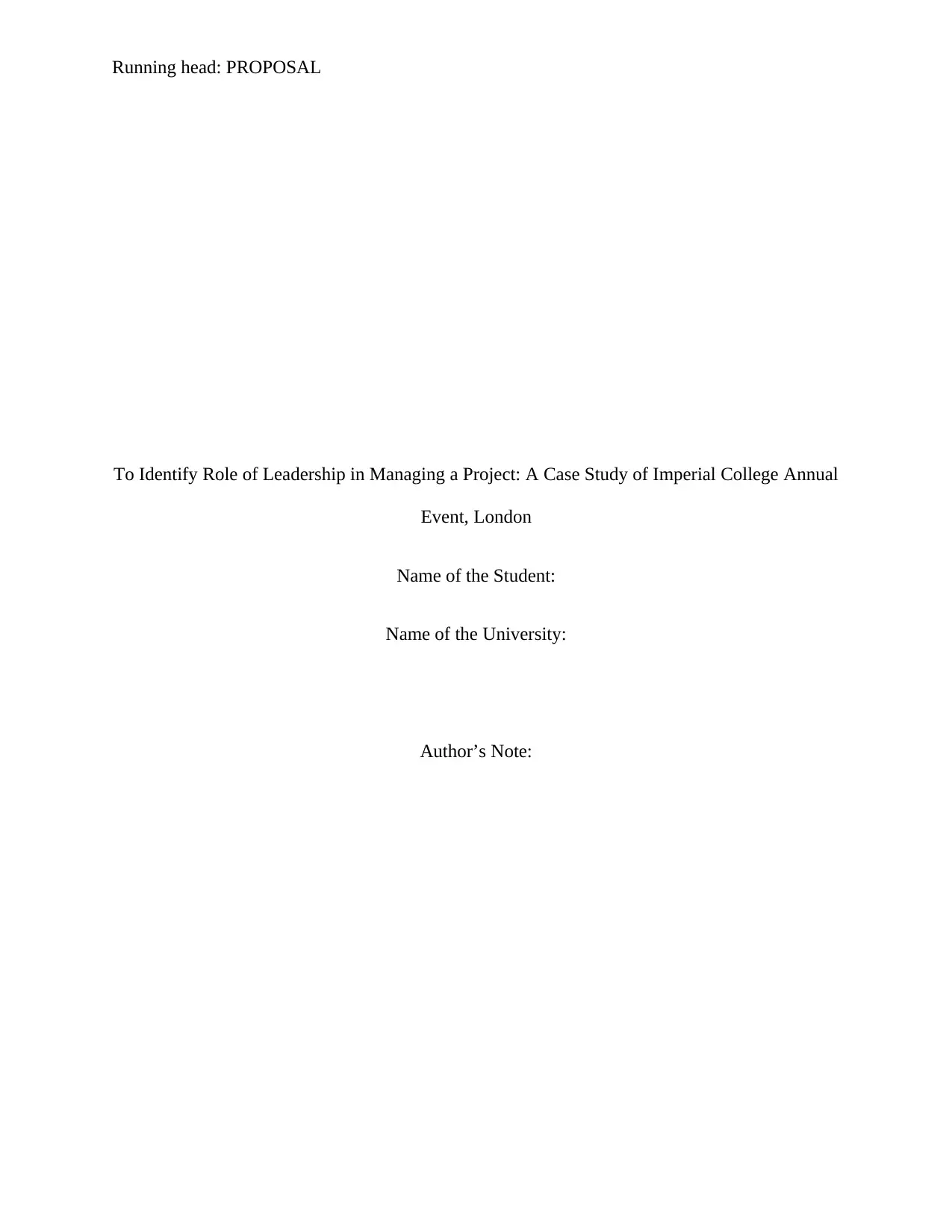
Running head: PROPOSAL
To Identify Role of Leadership in Managing a Project: A Case Study of Imperial College Annual
Event, London
Name of the Student:
Name of the University:
Author’s Note:
To Identify Role of Leadership in Managing a Project: A Case Study of Imperial College Annual
Event, London
Name of the Student:
Name of the University:
Author’s Note:
Paraphrase This Document
Need a fresh take? Get an instant paraphrase of this document with our AI Paraphraser
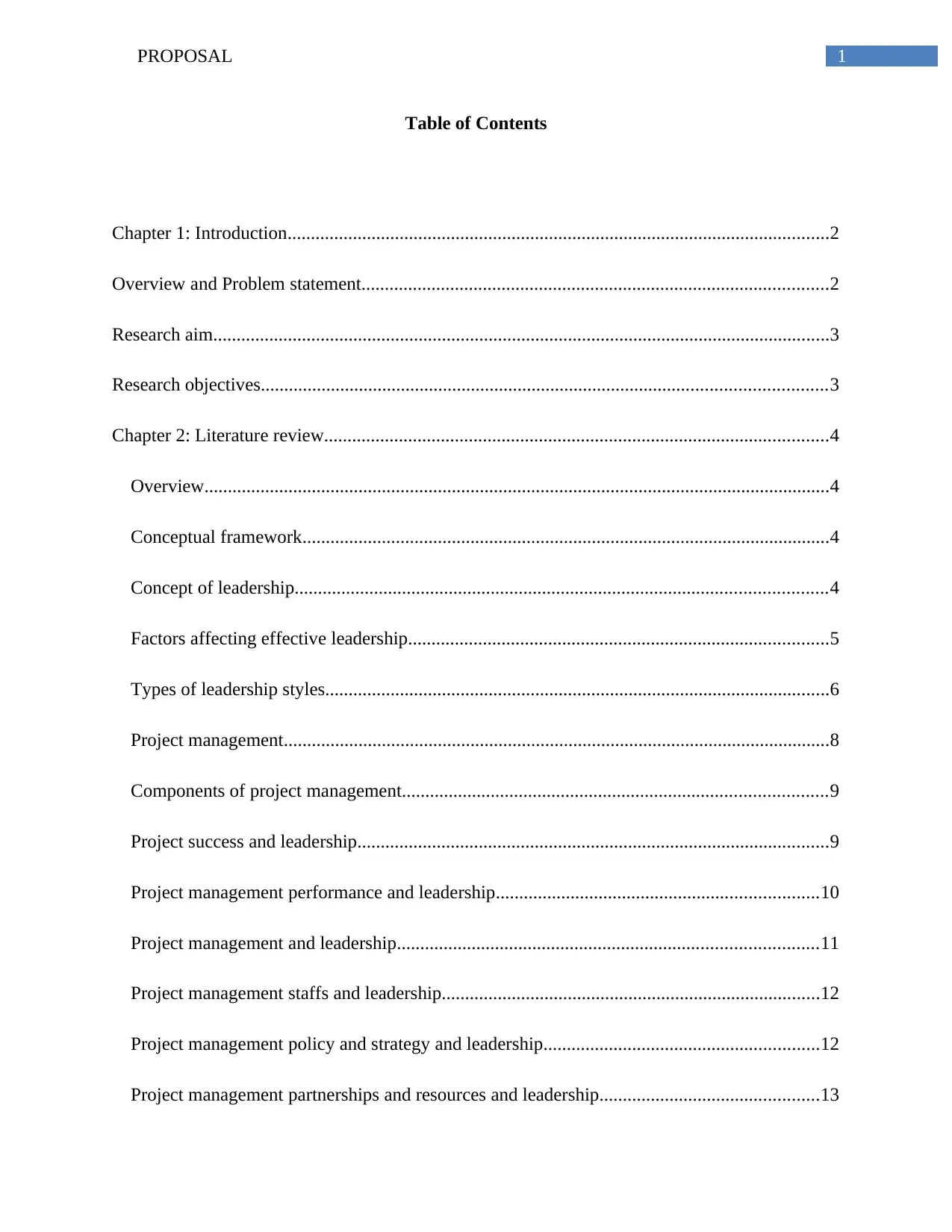
1PROPOSAL
Table of Contents
Chapter 1: Introduction....................................................................................................................2
Overview and Problem statement....................................................................................................2
Research aim....................................................................................................................................3
Research objectives.........................................................................................................................3
Chapter 2: Literature review............................................................................................................4
Overview......................................................................................................................................4
Conceptual framework.................................................................................................................4
Concept of leadership..................................................................................................................4
Factors affecting effective leadership..........................................................................................5
Types of leadership styles............................................................................................................6
Project management.....................................................................................................................8
Components of project management...........................................................................................9
Project success and leadership.....................................................................................................9
Project management performance and leadership.....................................................................10
Project management and leadership..........................................................................................11
Project management staffs and leadership.................................................................................12
Project management policy and strategy and leadership...........................................................12
Project management partnerships and resources and leadership...............................................13
Table of Contents
Chapter 1: Introduction....................................................................................................................2
Overview and Problem statement....................................................................................................2
Research aim....................................................................................................................................3
Research objectives.........................................................................................................................3
Chapter 2: Literature review............................................................................................................4
Overview......................................................................................................................................4
Conceptual framework.................................................................................................................4
Concept of leadership..................................................................................................................4
Factors affecting effective leadership..........................................................................................5
Types of leadership styles............................................................................................................6
Project management.....................................................................................................................8
Components of project management...........................................................................................9
Project success and leadership.....................................................................................................9
Project management performance and leadership.....................................................................10
Project management and leadership..........................................................................................11
Project management staffs and leadership.................................................................................12
Project management policy and strategy and leadership...........................................................12
Project management partnerships and resources and leadership...............................................13
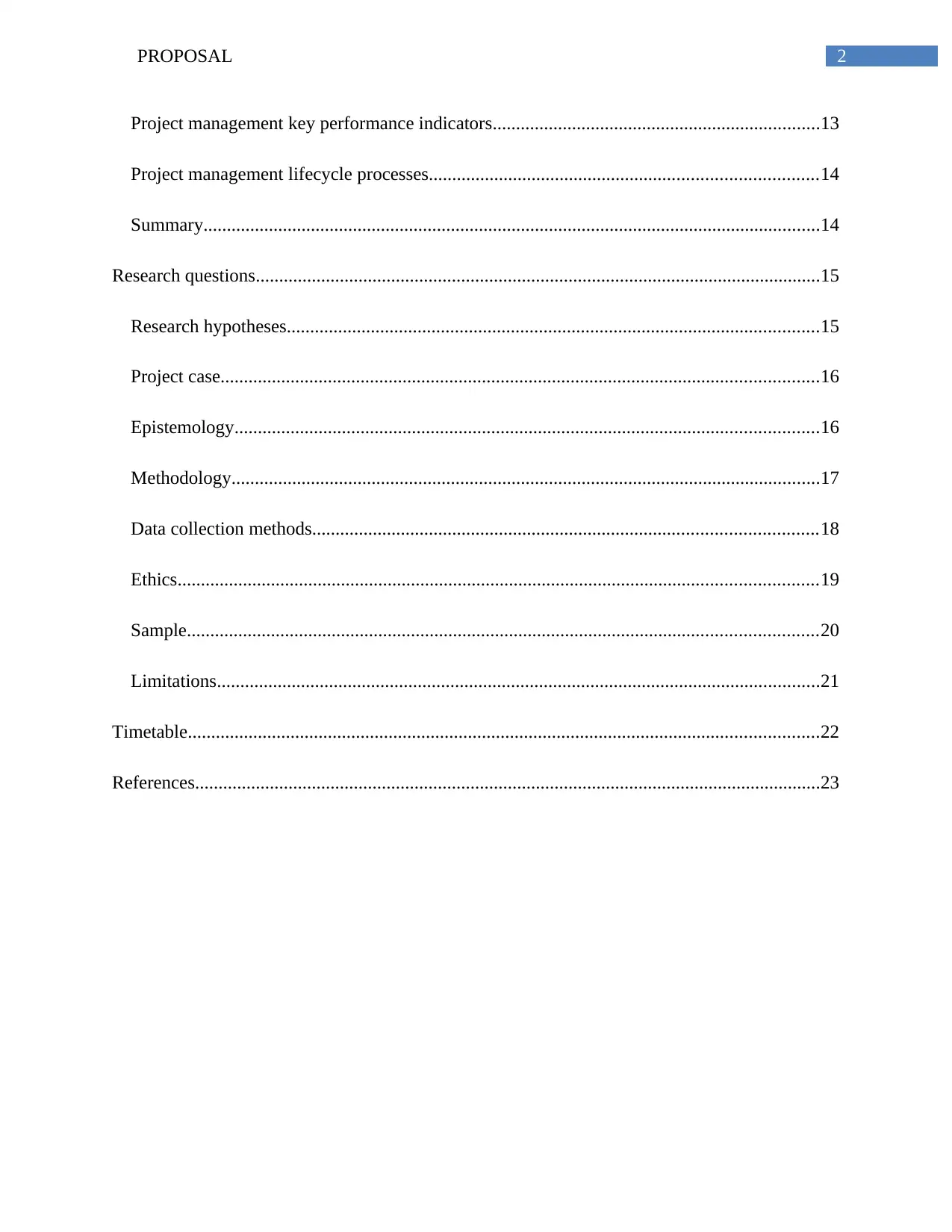
2PROPOSAL
Project management key performance indicators......................................................................13
Project management lifecycle processes...................................................................................14
Summary....................................................................................................................................14
Research questions.........................................................................................................................15
Research hypotheses..................................................................................................................15
Project case................................................................................................................................16
Epistemology.............................................................................................................................16
Methodology..............................................................................................................................17
Data collection methods............................................................................................................18
Ethics.........................................................................................................................................19
Sample.......................................................................................................................................20
Limitations.................................................................................................................................21
Timetable.......................................................................................................................................22
References......................................................................................................................................23
Project management key performance indicators......................................................................13
Project management lifecycle processes...................................................................................14
Summary....................................................................................................................................14
Research questions.........................................................................................................................15
Research hypotheses..................................................................................................................15
Project case................................................................................................................................16
Epistemology.............................................................................................................................16
Methodology..............................................................................................................................17
Data collection methods............................................................................................................18
Ethics.........................................................................................................................................19
Sample.......................................................................................................................................20
Limitations.................................................................................................................................21
Timetable.......................................................................................................................................22
References......................................................................................................................................23
⊘ This is a preview!⊘
Do you want full access?
Subscribe today to unlock all pages.

Trusted by 1+ million students worldwide
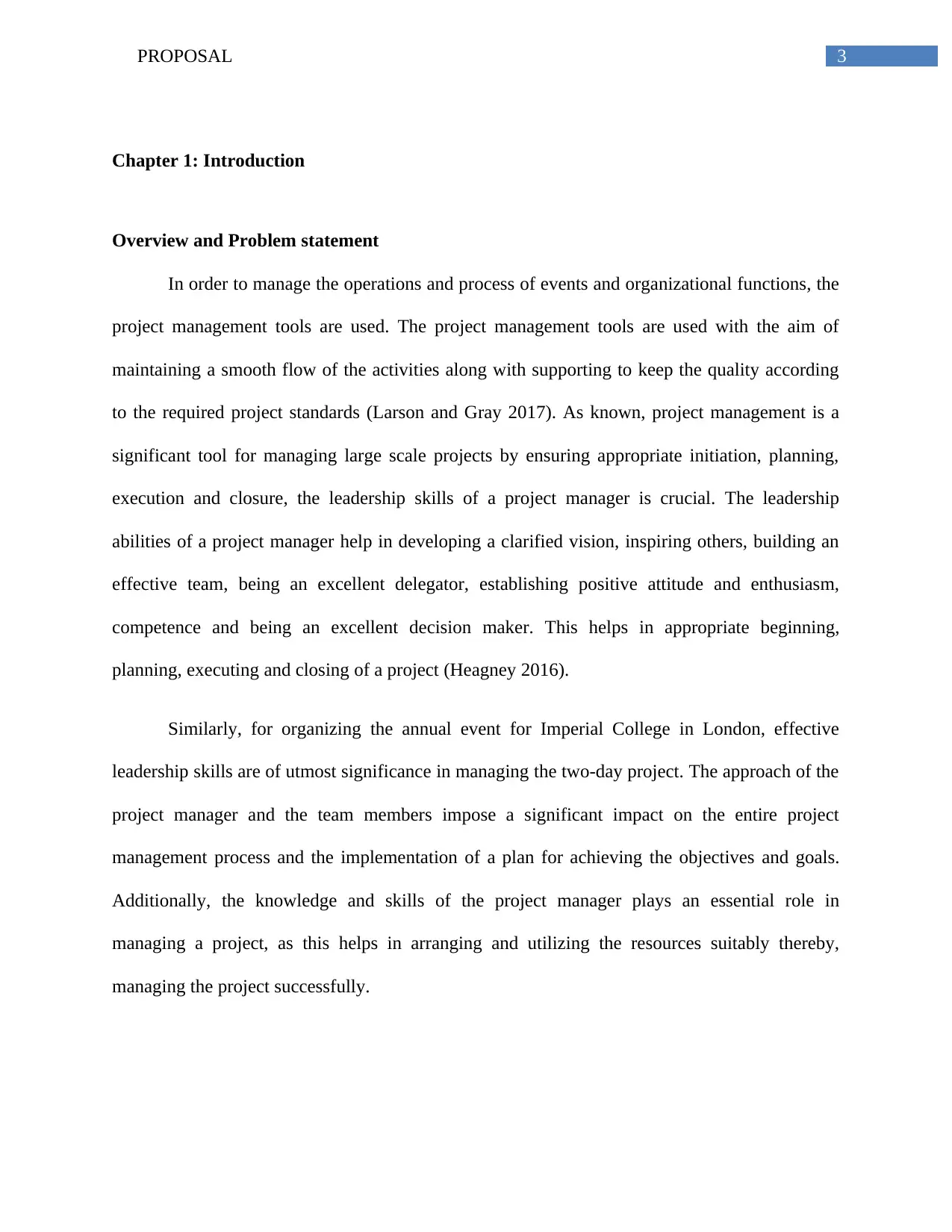
3PROPOSAL
Chapter 1: Introduction
Overview and Problem statement
In order to manage the operations and process of events and organizational functions, the
project management tools are used. The project management tools are used with the aim of
maintaining a smooth flow of the activities along with supporting to keep the quality according
to the required project standards (Larson and Gray 2017). As known, project management is a
significant tool for managing large scale projects by ensuring appropriate initiation, planning,
execution and closure, the leadership skills of a project manager is crucial. The leadership
abilities of a project manager help in developing a clarified vision, inspiring others, building an
effective team, being an excellent delegator, establishing positive attitude and enthusiasm,
competence and being an excellent decision maker. This helps in appropriate beginning,
planning, executing and closing of a project (Heagney 2016).
Similarly, for organizing the annual event for Imperial College in London, effective
leadership skills are of utmost significance in managing the two-day project. The approach of the
project manager and the team members impose a significant impact on the entire project
management process and the implementation of a plan for achieving the objectives and goals.
Additionally, the knowledge and skills of the project manager plays an essential role in
managing a project, as this helps in arranging and utilizing the resources suitably thereby,
managing the project successfully.
Chapter 1: Introduction
Overview and Problem statement
In order to manage the operations and process of events and organizational functions, the
project management tools are used. The project management tools are used with the aim of
maintaining a smooth flow of the activities along with supporting to keep the quality according
to the required project standards (Larson and Gray 2017). As known, project management is a
significant tool for managing large scale projects by ensuring appropriate initiation, planning,
execution and closure, the leadership skills of a project manager is crucial. The leadership
abilities of a project manager help in developing a clarified vision, inspiring others, building an
effective team, being an excellent delegator, establishing positive attitude and enthusiasm,
competence and being an excellent decision maker. This helps in appropriate beginning,
planning, executing and closing of a project (Heagney 2016).
Similarly, for organizing the annual event for Imperial College in London, effective
leadership skills are of utmost significance in managing the two-day project. The approach of the
project manager and the team members impose a significant impact on the entire project
management process and the implementation of a plan for achieving the objectives and goals.
Additionally, the knowledge and skills of the project manager plays an essential role in
managing a project, as this helps in arranging and utilizing the resources suitably thereby,
managing the project successfully.
Paraphrase This Document
Need a fresh take? Get an instant paraphrase of this document with our AI Paraphraser
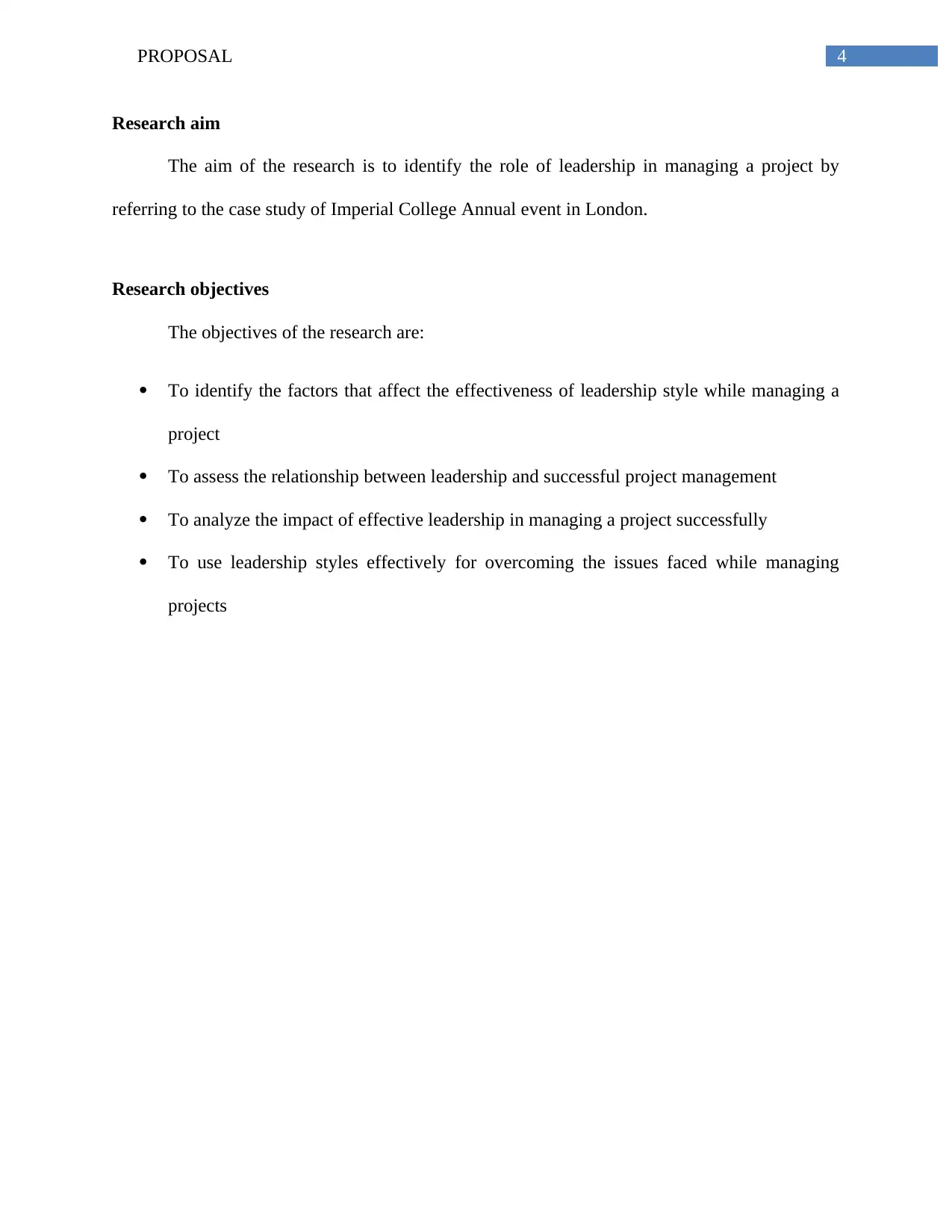
4PROPOSAL
Research aim
The aim of the research is to identify the role of leadership in managing a project by
referring to the case study of Imperial College Annual event in London.
Research objectives
The objectives of the research are:
To identify the factors that affect the effectiveness of leadership style while managing a
project
To assess the relationship between leadership and successful project management
To analyze the impact of effective leadership in managing a project successfully
To use leadership styles effectively for overcoming the issues faced while managing
projects
Research aim
The aim of the research is to identify the role of leadership in managing a project by
referring to the case study of Imperial College Annual event in London.
Research objectives
The objectives of the research are:
To identify the factors that affect the effectiveness of leadership style while managing a
project
To assess the relationship between leadership and successful project management
To analyze the impact of effective leadership in managing a project successfully
To use leadership styles effectively for overcoming the issues faced while managing
projects
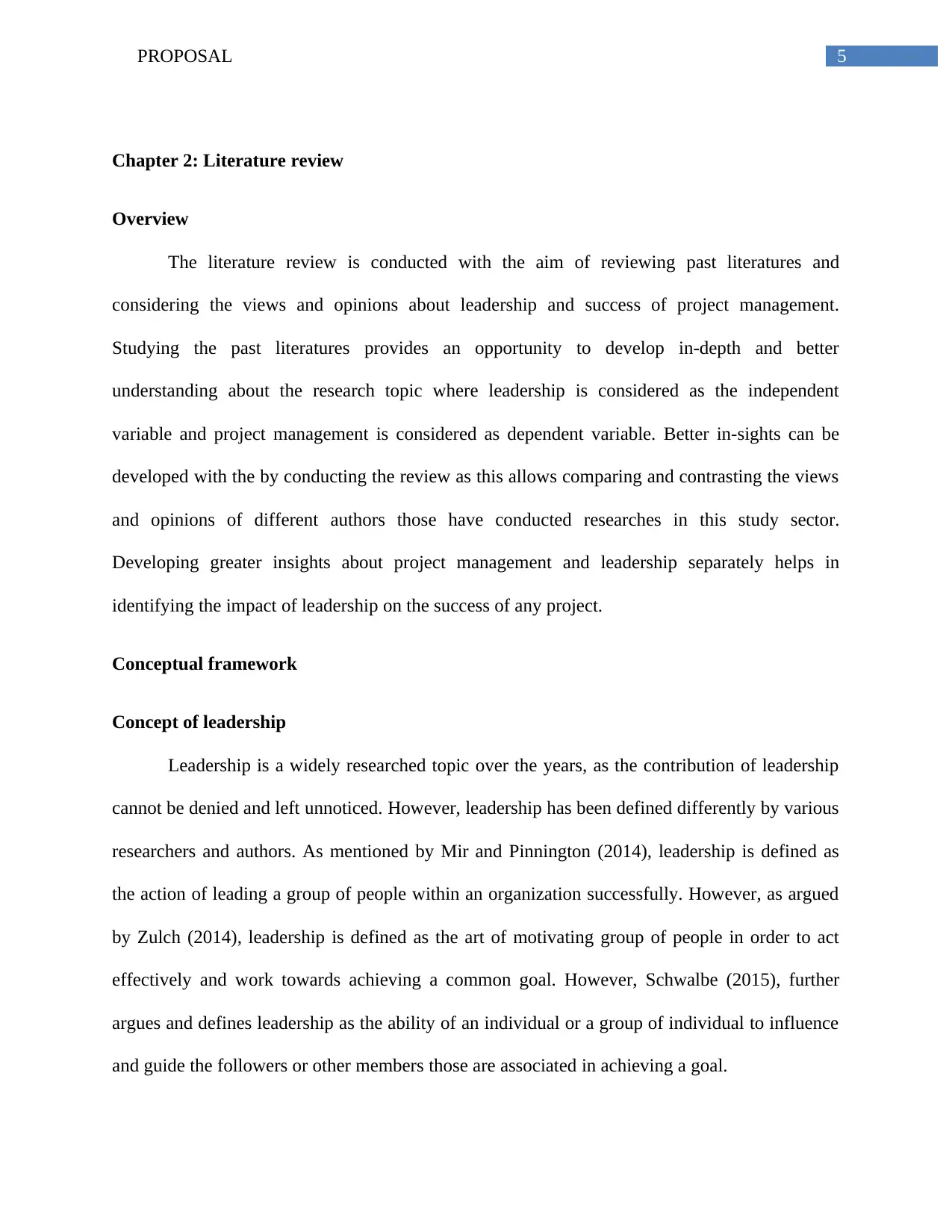
5PROPOSAL
Chapter 2: Literature review
Overview
The literature review is conducted with the aim of reviewing past literatures and
considering the views and opinions about leadership and success of project management.
Studying the past literatures provides an opportunity to develop in-depth and better
understanding about the research topic where leadership is considered as the independent
variable and project management is considered as dependent variable. Better in-sights can be
developed with the by conducting the review as this allows comparing and contrasting the views
and opinions of different authors those have conducted researches in this study sector.
Developing greater insights about project management and leadership separately helps in
identifying the impact of leadership on the success of any project.
Conceptual framework
Concept of leadership
Leadership is a widely researched topic over the years, as the contribution of leadership
cannot be denied and left unnoticed. However, leadership has been defined differently by various
researchers and authors. As mentioned by Mir and Pinnington (2014), leadership is defined as
the action of leading a group of people within an organization successfully. However, as argued
by Zulch (2014), leadership is defined as the art of motivating group of people in order to act
effectively and work towards achieving a common goal. However, Schwalbe (2015), further
argues and defines leadership as the ability of an individual or a group of individual to influence
and guide the followers or other members those are associated in achieving a goal.
Chapter 2: Literature review
Overview
The literature review is conducted with the aim of reviewing past literatures and
considering the views and opinions about leadership and success of project management.
Studying the past literatures provides an opportunity to develop in-depth and better
understanding about the research topic where leadership is considered as the independent
variable and project management is considered as dependent variable. Better in-sights can be
developed with the by conducting the review as this allows comparing and contrasting the views
and opinions of different authors those have conducted researches in this study sector.
Developing greater insights about project management and leadership separately helps in
identifying the impact of leadership on the success of any project.
Conceptual framework
Concept of leadership
Leadership is a widely researched topic over the years, as the contribution of leadership
cannot be denied and left unnoticed. However, leadership has been defined differently by various
researchers and authors. As mentioned by Mir and Pinnington (2014), leadership is defined as
the action of leading a group of people within an organization successfully. However, as argued
by Zulch (2014), leadership is defined as the art of motivating group of people in order to act
effectively and work towards achieving a common goal. However, Schwalbe (2015), further
argues and defines leadership as the ability of an individual or a group of individual to influence
and guide the followers or other members those are associated in achieving a goal.
⊘ This is a preview!⊘
Do you want full access?
Subscribe today to unlock all pages.

Trusted by 1+ million students worldwide
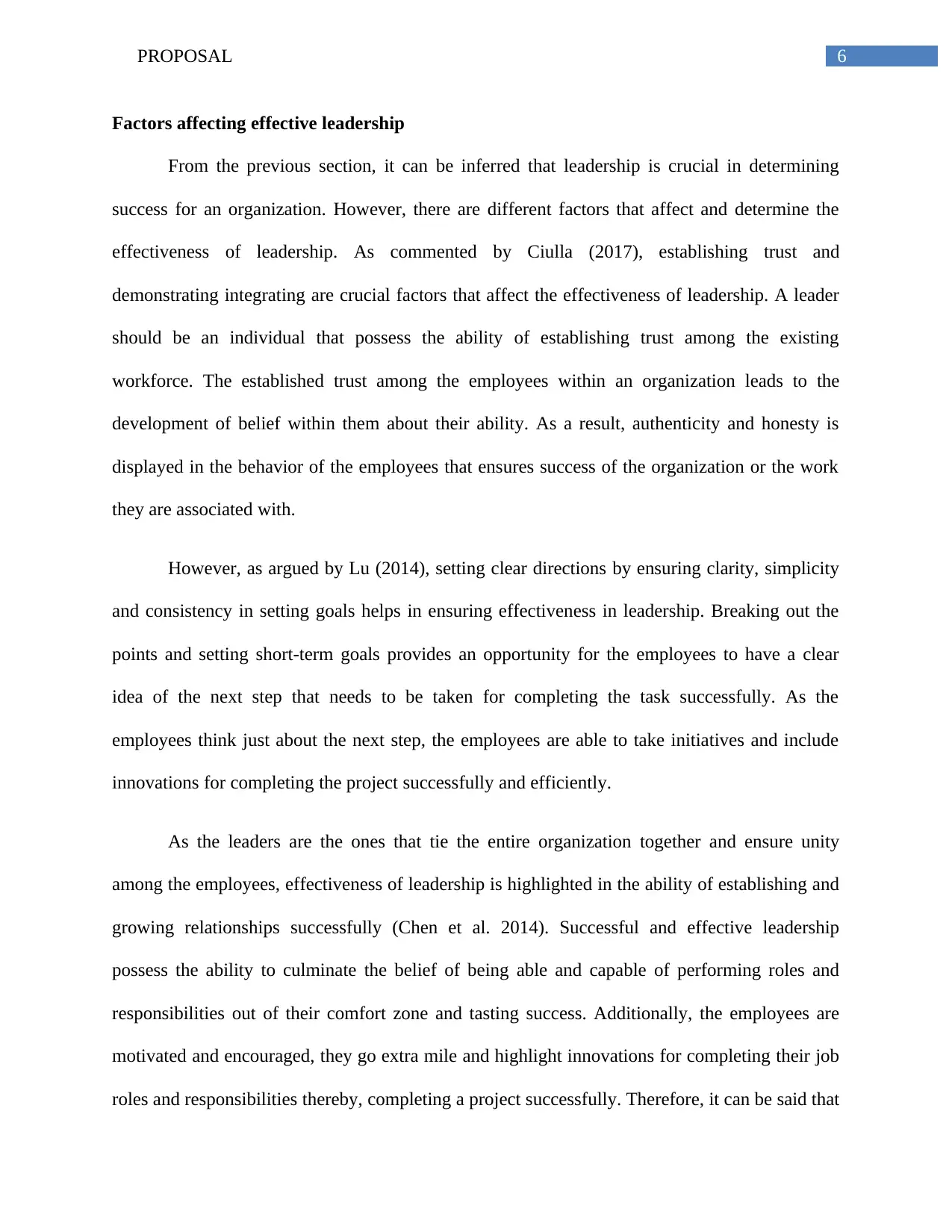
6PROPOSAL
Factors affecting effective leadership
From the previous section, it can be inferred that leadership is crucial in determining
success for an organization. However, there are different factors that affect and determine the
effectiveness of leadership. As commented by Ciulla (2017), establishing trust and
demonstrating integrating are crucial factors that affect the effectiveness of leadership. A leader
should be an individual that possess the ability of establishing trust among the existing
workforce. The established trust among the employees within an organization leads to the
development of belief within them about their ability. As a result, authenticity and honesty is
displayed in the behavior of the employees that ensures success of the organization or the work
they are associated with.
However, as argued by Lu (2014), setting clear directions by ensuring clarity, simplicity
and consistency in setting goals helps in ensuring effectiveness in leadership. Breaking out the
points and setting short-term goals provides an opportunity for the employees to have a clear
idea of the next step that needs to be taken for completing the task successfully. As the
employees think just about the next step, the employees are able to take initiatives and include
innovations for completing the project successfully and efficiently.
As the leaders are the ones that tie the entire organization together and ensure unity
among the employees, effectiveness of leadership is highlighted in the ability of establishing and
growing relationships successfully (Chen et al. 2014). Successful and effective leadership
possess the ability to culminate the belief of being able and capable of performing roles and
responsibilities out of their comfort zone and tasting success. Additionally, the employees are
motivated and encouraged, they go extra mile and highlight innovations for completing their job
roles and responsibilities thereby, completing a project successfully. Therefore, it can be said that
Factors affecting effective leadership
From the previous section, it can be inferred that leadership is crucial in determining
success for an organization. However, there are different factors that affect and determine the
effectiveness of leadership. As commented by Ciulla (2017), establishing trust and
demonstrating integrating are crucial factors that affect the effectiveness of leadership. A leader
should be an individual that possess the ability of establishing trust among the existing
workforce. The established trust among the employees within an organization leads to the
development of belief within them about their ability. As a result, authenticity and honesty is
displayed in the behavior of the employees that ensures success of the organization or the work
they are associated with.
However, as argued by Lu (2014), setting clear directions by ensuring clarity, simplicity
and consistency in setting goals helps in ensuring effectiveness in leadership. Breaking out the
points and setting short-term goals provides an opportunity for the employees to have a clear
idea of the next step that needs to be taken for completing the task successfully. As the
employees think just about the next step, the employees are able to take initiatives and include
innovations for completing the project successfully and efficiently.
As the leaders are the ones that tie the entire organization together and ensure unity
among the employees, effectiveness of leadership is highlighted in the ability of establishing and
growing relationships successfully (Chen et al. 2014). Successful and effective leadership
possess the ability to culminate the belief of being able and capable of performing roles and
responsibilities out of their comfort zone and tasting success. Additionally, the employees are
motivated and encouraged, they go extra mile and highlight innovations for completing their job
roles and responsibilities thereby, completing a project successfully. Therefore, it can be said that
Paraphrase This Document
Need a fresh take? Get an instant paraphrase of this document with our AI Paraphraser
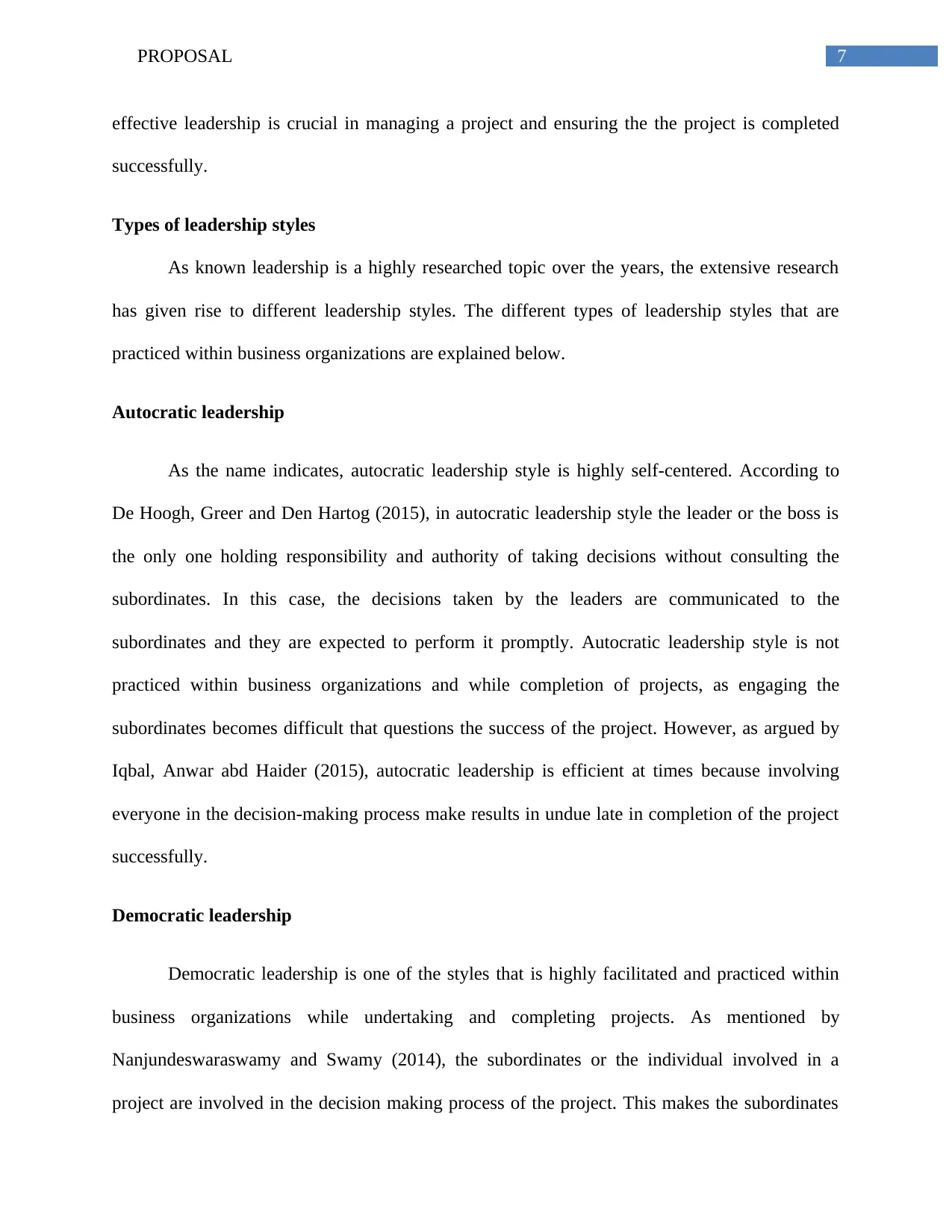
7PROPOSAL
effective leadership is crucial in managing a project and ensuring the the project is completed
successfully.
Types of leadership styles
As known leadership is a highly researched topic over the years, the extensive research
has given rise to different leadership styles. The different types of leadership styles that are
practiced within business organizations are explained below.
Autocratic leadership
As the name indicates, autocratic leadership style is highly self-centered. According to
De Hoogh, Greer and Den Hartog (2015), in autocratic leadership style the leader or the boss is
the only one holding responsibility and authority of taking decisions without consulting the
subordinates. In this case, the decisions taken by the leaders are communicated to the
subordinates and they are expected to perform it promptly. Autocratic leadership style is not
practiced within business organizations and while completion of projects, as engaging the
subordinates becomes difficult that questions the success of the project. However, as argued by
Iqbal, Anwar abd Haider (2015), autocratic leadership is efficient at times because involving
everyone in the decision-making process make results in undue late in completion of the project
successfully.
Democratic leadership
Democratic leadership is one of the styles that is highly facilitated and practiced within
business organizations while undertaking and completing projects. As mentioned by
Nanjundeswaraswamy and Swamy (2014), the subordinates or the individual involved in a
project are involved in the decision making process of the project. This makes the subordinates
effective leadership is crucial in managing a project and ensuring the the project is completed
successfully.
Types of leadership styles
As known leadership is a highly researched topic over the years, the extensive research
has given rise to different leadership styles. The different types of leadership styles that are
practiced within business organizations are explained below.
Autocratic leadership
As the name indicates, autocratic leadership style is highly self-centered. According to
De Hoogh, Greer and Den Hartog (2015), in autocratic leadership style the leader or the boss is
the only one holding responsibility and authority of taking decisions without consulting the
subordinates. In this case, the decisions taken by the leaders are communicated to the
subordinates and they are expected to perform it promptly. Autocratic leadership style is not
practiced within business organizations and while completion of projects, as engaging the
subordinates becomes difficult that questions the success of the project. However, as argued by
Iqbal, Anwar abd Haider (2015), autocratic leadership is efficient at times because involving
everyone in the decision-making process make results in undue late in completion of the project
successfully.
Democratic leadership
Democratic leadership is one of the styles that is highly facilitated and practiced within
business organizations while undertaking and completing projects. As mentioned by
Nanjundeswaraswamy and Swamy (2014), the subordinates or the individual involved in a
project are involved in the decision making process of the project. This makes the subordinates
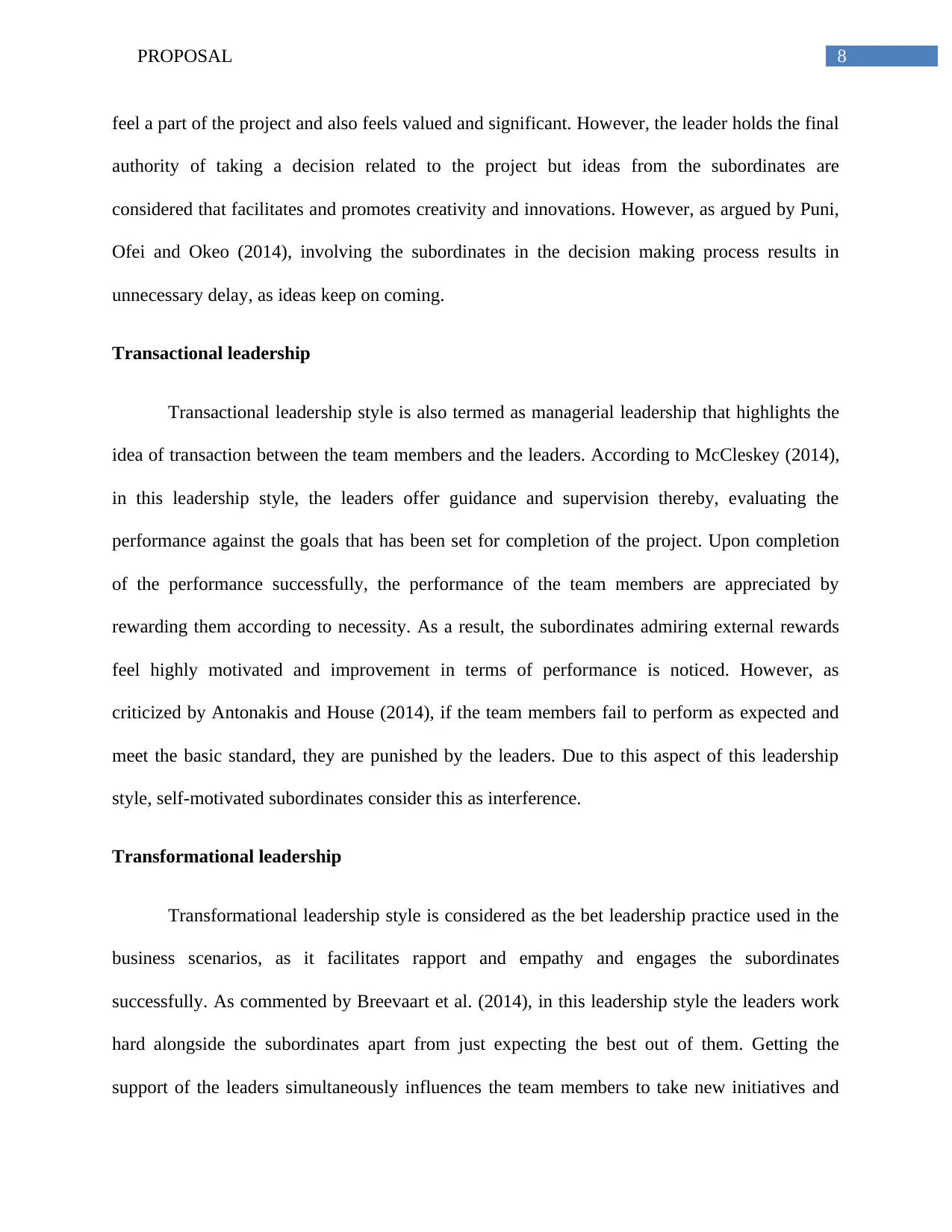
8PROPOSAL
feel a part of the project and also feels valued and significant. However, the leader holds the final
authority of taking a decision related to the project but ideas from the subordinates are
considered that facilitates and promotes creativity and innovations. However, as argued by Puni,
Ofei and Okeo (2014), involving the subordinates in the decision making process results in
unnecessary delay, as ideas keep on coming.
Transactional leadership
Transactional leadership style is also termed as managerial leadership that highlights the
idea of transaction between the team members and the leaders. According to McCleskey (2014),
in this leadership style, the leaders offer guidance and supervision thereby, evaluating the
performance against the goals that has been set for completion of the project. Upon completion
of the performance successfully, the performance of the team members are appreciated by
rewarding them according to necessity. As a result, the subordinates admiring external rewards
feel highly motivated and improvement in terms of performance is noticed. However, as
criticized by Antonakis and House (2014), if the team members fail to perform as expected and
meet the basic standard, they are punished by the leaders. Due to this aspect of this leadership
style, self-motivated subordinates consider this as interference.
Transformational leadership
Transformational leadership style is considered as the bet leadership practice used in the
business scenarios, as it facilitates rapport and empathy and engages the subordinates
successfully. As commented by Breevaart et al. (2014), in this leadership style the leaders work
hard alongside the subordinates apart from just expecting the best out of them. Getting the
support of the leaders simultaneously influences the team members to take new initiatives and
feel a part of the project and also feels valued and significant. However, the leader holds the final
authority of taking a decision related to the project but ideas from the subordinates are
considered that facilitates and promotes creativity and innovations. However, as argued by Puni,
Ofei and Okeo (2014), involving the subordinates in the decision making process results in
unnecessary delay, as ideas keep on coming.
Transactional leadership
Transactional leadership style is also termed as managerial leadership that highlights the
idea of transaction between the team members and the leaders. According to McCleskey (2014),
in this leadership style, the leaders offer guidance and supervision thereby, evaluating the
performance against the goals that has been set for completion of the project. Upon completion
of the performance successfully, the performance of the team members are appreciated by
rewarding them according to necessity. As a result, the subordinates admiring external rewards
feel highly motivated and improvement in terms of performance is noticed. However, as
criticized by Antonakis and House (2014), if the team members fail to perform as expected and
meet the basic standard, they are punished by the leaders. Due to this aspect of this leadership
style, self-motivated subordinates consider this as interference.
Transformational leadership
Transformational leadership style is considered as the bet leadership practice used in the
business scenarios, as it facilitates rapport and empathy and engages the subordinates
successfully. As commented by Breevaart et al. (2014), in this leadership style the leaders work
hard alongside the subordinates apart from just expecting the best out of them. Getting the
support of the leaders simultaneously influences the team members to take new initiatives and
⊘ This is a preview!⊘
Do you want full access?
Subscribe today to unlock all pages.

Trusted by 1+ million students worldwide
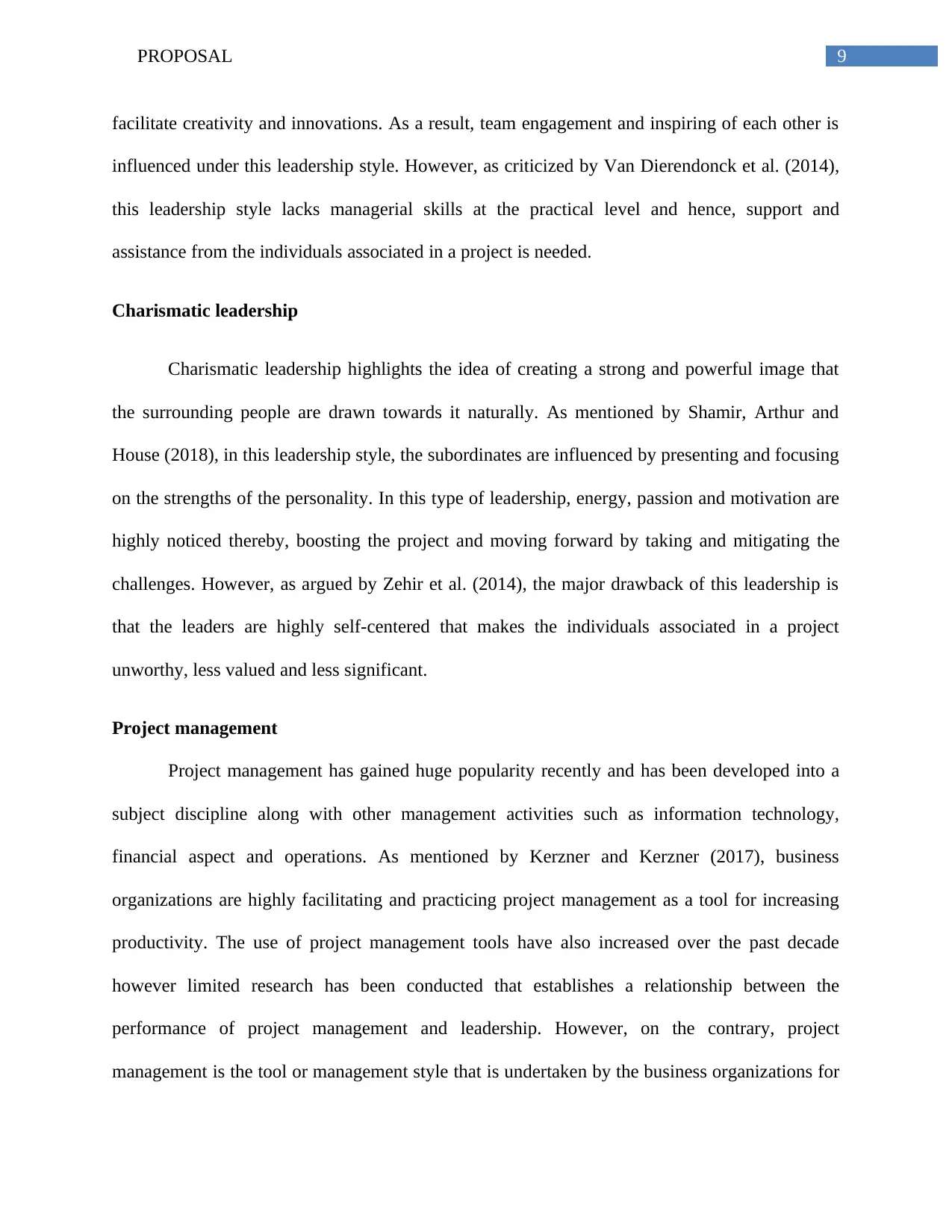
9PROPOSAL
facilitate creativity and innovations. As a result, team engagement and inspiring of each other is
influenced under this leadership style. However, as criticized by Van Dierendonck et al. (2014),
this leadership style lacks managerial skills at the practical level and hence, support and
assistance from the individuals associated in a project is needed.
Charismatic leadership
Charismatic leadership highlights the idea of creating a strong and powerful image that
the surrounding people are drawn towards it naturally. As mentioned by Shamir, Arthur and
House (2018), in this leadership style, the subordinates are influenced by presenting and focusing
on the strengths of the personality. In this type of leadership, energy, passion and motivation are
highly noticed thereby, boosting the project and moving forward by taking and mitigating the
challenges. However, as argued by Zehir et al. (2014), the major drawback of this leadership is
that the leaders are highly self-centered that makes the individuals associated in a project
unworthy, less valued and less significant.
Project management
Project management has gained huge popularity recently and has been developed into a
subject discipline along with other management activities such as information technology,
financial aspect and operations. As mentioned by Kerzner and Kerzner (2017), business
organizations are highly facilitating and practicing project management as a tool for increasing
productivity. The use of project management tools have also increased over the past decade
however limited research has been conducted that establishes a relationship between the
performance of project management and leadership. However, on the contrary, project
management is the tool or management style that is undertaken by the business organizations for
facilitate creativity and innovations. As a result, team engagement and inspiring of each other is
influenced under this leadership style. However, as criticized by Van Dierendonck et al. (2014),
this leadership style lacks managerial skills at the practical level and hence, support and
assistance from the individuals associated in a project is needed.
Charismatic leadership
Charismatic leadership highlights the idea of creating a strong and powerful image that
the surrounding people are drawn towards it naturally. As mentioned by Shamir, Arthur and
House (2018), in this leadership style, the subordinates are influenced by presenting and focusing
on the strengths of the personality. In this type of leadership, energy, passion and motivation are
highly noticed thereby, boosting the project and moving forward by taking and mitigating the
challenges. However, as argued by Zehir et al. (2014), the major drawback of this leadership is
that the leaders are highly self-centered that makes the individuals associated in a project
unworthy, less valued and less significant.
Project management
Project management has gained huge popularity recently and has been developed into a
subject discipline along with other management activities such as information technology,
financial aspect and operations. As mentioned by Kerzner and Kerzner (2017), business
organizations are highly facilitating and practicing project management as a tool for increasing
productivity. The use of project management tools have also increased over the past decade
however limited research has been conducted that establishes a relationship between the
performance of project management and leadership. However, on the contrary, project
management is the tool or management style that is undertaken by the business organizations for
Paraphrase This Document
Need a fresh take? Get an instant paraphrase of this document with our AI Paraphraser
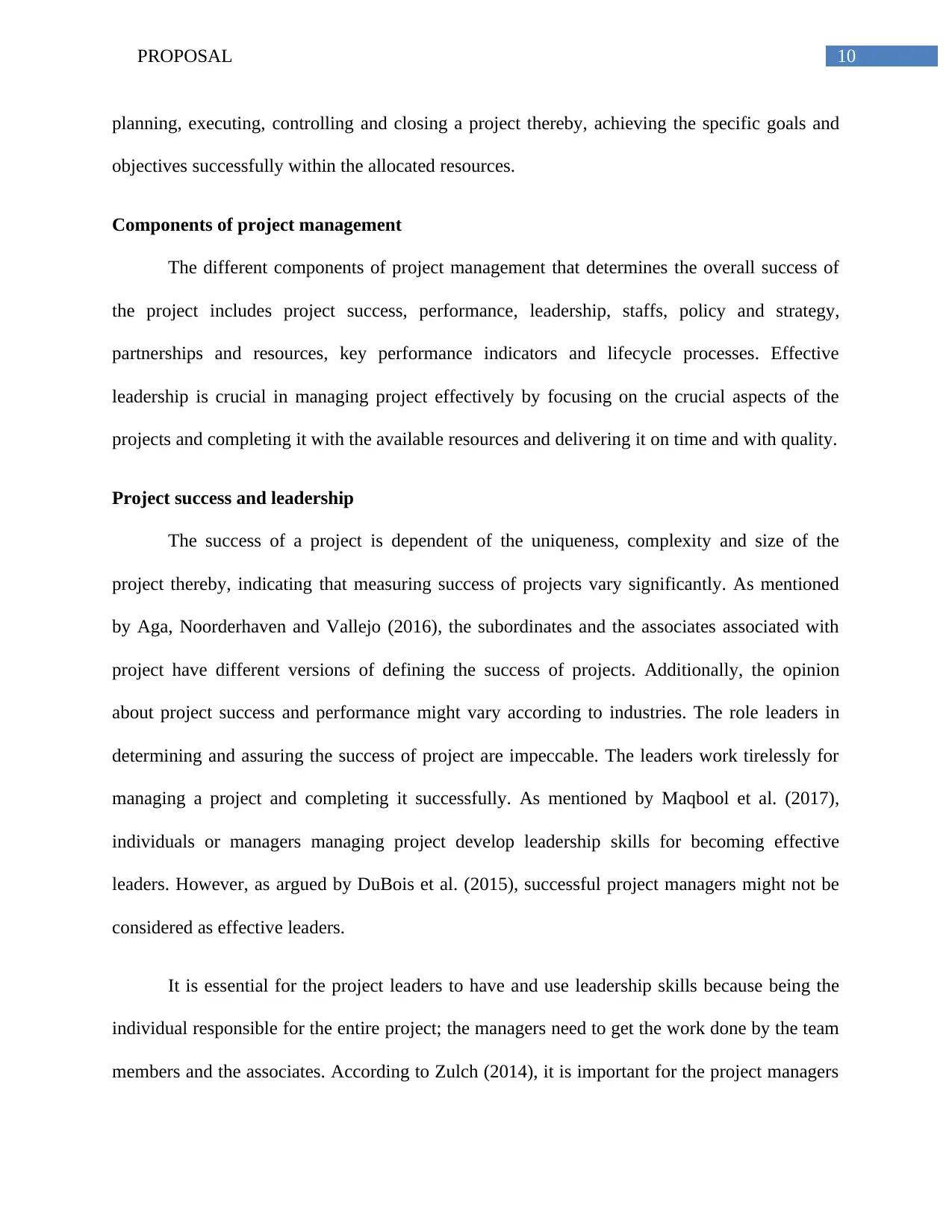
10PROPOSAL
planning, executing, controlling and closing a project thereby, achieving the specific goals and
objectives successfully within the allocated resources.
Components of project management
The different components of project management that determines the overall success of
the project includes project success, performance, leadership, staffs, policy and strategy,
partnerships and resources, key performance indicators and lifecycle processes. Effective
leadership is crucial in managing project effectively by focusing on the crucial aspects of the
projects and completing it with the available resources and delivering it on time and with quality.
Project success and leadership
The success of a project is dependent of the uniqueness, complexity and size of the
project thereby, indicating that measuring success of projects vary significantly. As mentioned
by Aga, Noorderhaven and Vallejo (2016), the subordinates and the associates associated with
project have different versions of defining the success of projects. Additionally, the opinion
about project success and performance might vary according to industries. The role leaders in
determining and assuring the success of project are impeccable. The leaders work tirelessly for
managing a project and completing it successfully. As mentioned by Maqbool et al. (2017),
individuals or managers managing project develop leadership skills for becoming effective
leaders. However, as argued by DuBois et al. (2015), successful project managers might not be
considered as effective leaders.
It is essential for the project leaders to have and use leadership skills because being the
individual responsible for the entire project; the managers need to get the work done by the team
members and the associates. According to Zulch (2014), it is important for the project managers
planning, executing, controlling and closing a project thereby, achieving the specific goals and
objectives successfully within the allocated resources.
Components of project management
The different components of project management that determines the overall success of
the project includes project success, performance, leadership, staffs, policy and strategy,
partnerships and resources, key performance indicators and lifecycle processes. Effective
leadership is crucial in managing project effectively by focusing on the crucial aspects of the
projects and completing it with the available resources and delivering it on time and with quality.
Project success and leadership
The success of a project is dependent of the uniqueness, complexity and size of the
project thereby, indicating that measuring success of projects vary significantly. As mentioned
by Aga, Noorderhaven and Vallejo (2016), the subordinates and the associates associated with
project have different versions of defining the success of projects. Additionally, the opinion
about project success and performance might vary according to industries. The role leaders in
determining and assuring the success of project are impeccable. The leaders work tirelessly for
managing a project and completing it successfully. As mentioned by Maqbool et al. (2017),
individuals or managers managing project develop leadership skills for becoming effective
leaders. However, as argued by DuBois et al. (2015), successful project managers might not be
considered as effective leaders.
It is essential for the project leaders to have and use leadership skills because being the
individual responsible for the entire project; the managers need to get the work done by the team
members and the associates. According to Zulch (2014), it is important for the project managers
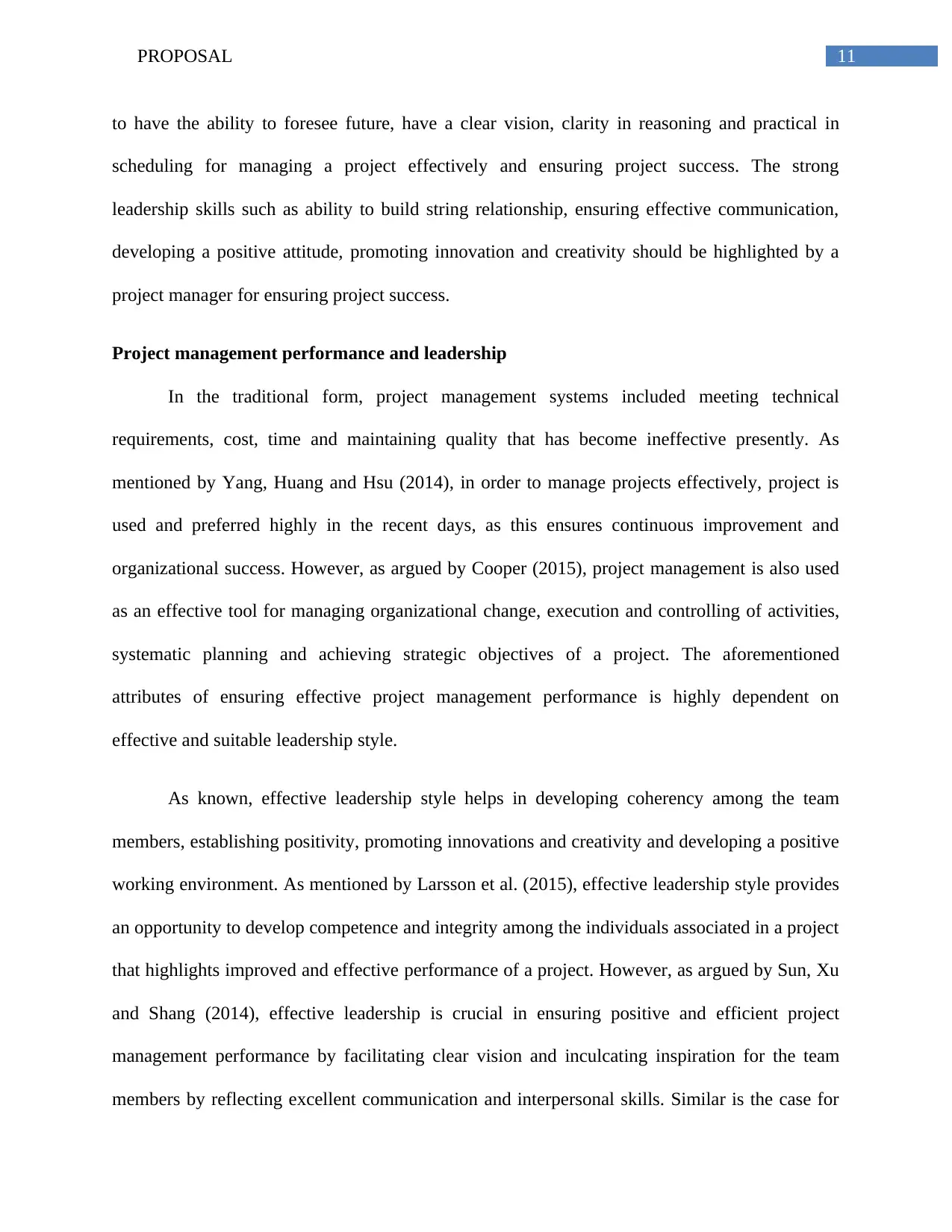
11PROPOSAL
to have the ability to foresee future, have a clear vision, clarity in reasoning and practical in
scheduling for managing a project effectively and ensuring project success. The strong
leadership skills such as ability to build string relationship, ensuring effective communication,
developing a positive attitude, promoting innovation and creativity should be highlighted by a
project manager for ensuring project success.
Project management performance and leadership
In the traditional form, project management systems included meeting technical
requirements, cost, time and maintaining quality that has become ineffective presently. As
mentioned by Yang, Huang and Hsu (2014), in order to manage projects effectively, project is
used and preferred highly in the recent days, as this ensures continuous improvement and
organizational success. However, as argued by Cooper (2015), project management is also used
as an effective tool for managing organizational change, execution and controlling of activities,
systematic planning and achieving strategic objectives of a project. The aforementioned
attributes of ensuring effective project management performance is highly dependent on
effective and suitable leadership style.
As known, effective leadership style helps in developing coherency among the team
members, establishing positivity, promoting innovations and creativity and developing a positive
working environment. As mentioned by Larsson et al. (2015), effective leadership style provides
an opportunity to develop competence and integrity among the individuals associated in a project
that highlights improved and effective performance of a project. However, as argued by Sun, Xu
and Shang (2014), effective leadership is crucial in ensuring positive and efficient project
management performance by facilitating clear vision and inculcating inspiration for the team
members by reflecting excellent communication and interpersonal skills. Similar is the case for
to have the ability to foresee future, have a clear vision, clarity in reasoning and practical in
scheduling for managing a project effectively and ensuring project success. The strong
leadership skills such as ability to build string relationship, ensuring effective communication,
developing a positive attitude, promoting innovation and creativity should be highlighted by a
project manager for ensuring project success.
Project management performance and leadership
In the traditional form, project management systems included meeting technical
requirements, cost, time and maintaining quality that has become ineffective presently. As
mentioned by Yang, Huang and Hsu (2014), in order to manage projects effectively, project is
used and preferred highly in the recent days, as this ensures continuous improvement and
organizational success. However, as argued by Cooper (2015), project management is also used
as an effective tool for managing organizational change, execution and controlling of activities,
systematic planning and achieving strategic objectives of a project. The aforementioned
attributes of ensuring effective project management performance is highly dependent on
effective and suitable leadership style.
As known, effective leadership style helps in developing coherency among the team
members, establishing positivity, promoting innovations and creativity and developing a positive
working environment. As mentioned by Larsson et al. (2015), effective leadership style provides
an opportunity to develop competence and integrity among the individuals associated in a project
that highlights improved and effective performance of a project. However, as argued by Sun, Xu
and Shang (2014), effective leadership is crucial in ensuring positive and efficient project
management performance by facilitating clear vision and inculcating inspiration for the team
members by reflecting excellent communication and interpersonal skills. Similar is the case for
⊘ This is a preview!⊘
Do you want full access?
Subscribe today to unlock all pages.

Trusted by 1+ million students worldwide
1 out of 30
Related Documents
Your All-in-One AI-Powered Toolkit for Academic Success.
+13062052269
info@desklib.com
Available 24*7 on WhatsApp / Email
![[object Object]](/_next/static/media/star-bottom.7253800d.svg)
Unlock your academic potential
Copyright © 2020–2026 A2Z Services. All Rights Reserved. Developed and managed by ZUCOL.





